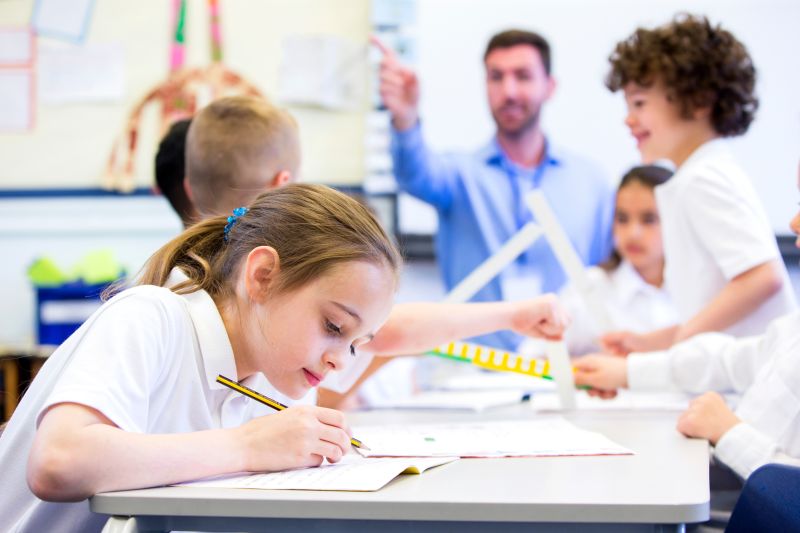
AdobeStock by dglimages.
<h2>Evidence is obviously a good thing. We take it for granted that evidence from research can help solve the post-lockdown crises in education – from how to keep teachers in the profession to how to improve behaviour in schools, get children back into school and protect the mental health of a generation.</h2>
<p>But <a href="https://bera-journals.onlinelibrary.wiley.com/doi/full/10.1002/rev3.3354" target="_blank">my research</a> and that of others shows that incorporating strategies that have evidence backing them into teaching doesn’t always yield the results we want.</p>
<p>The Department for Education encourages school leadership teams to <a href="https://assets.publishing.service.gov.uk/media/65cf69384239310011b7b91f/Using_Pupil_Premium_-_Guidance_for_School_Leaders.pdf" target="_blank">cite evidence</a> from research studies when deciding how to spend school funding. Teachers are more frequently required to <a href="https://www.tes.com/magazine/tes-explains/what-action-research" target="_blank">conduct their own research</a> as part of their professional training than they were a decade ago. <a href="https://evidencebased.education/" target="_blank">Independent consultancies</a> have sprung up to support schools to bring evidence-based methods into their teaching.</p>
<p><a href="https://www.schoolnews.co.nz/latest-print-issue/" target="_blank" rel="noopener"><strong>Read the latest print edition of <em>School News</em> HERE</strong></a> </p>
<p>This push for evidence to back up teaching methods has become particularly strong in the past ten years. The movement has been driven by the <a href="https://educationendowmentfoundation.org.uk/" target="_blank">Education Endowment Foundation</a> (EEF), a charity set up in 2011 with funding from the Conservative-Liberal Democrat coalition government to provide schools with information about which teaching methods and other approaches to education actually work.</p>
<p>The EEF funds <a href="https://educationendowmentfoundation.org.uk/news/eef-blog-randomised-controlled-trials-or-how-to-train-your-dragon" target="_blank">randomised controlled trials</a> – large-scale studies in which students are randomly assigned to an educational initiative or not and then comparisons are then made to see which students perform better. For instance, several of these studies have <a href="https://educationendowmentfoundation.org.uk/projects-and-evaluation/projects/catch-up-literacy-effectiveness-trial" target="_blank">been carried out</a> in which some children received one-on-one reading sessions with a trained classroom assistant, and their reading progress was compared to children who had not. The cost of one of these trials was around £500,000 over the course of a year.</p>
<p>Trials such as this in education were lobbied for by <a href="https://www.phc.ox.ac.uk/team/ben-goldacre" target="_blank">Ben Goldacre</a>, a doctor and data scientist who wrote a <a href="https://www.gov.uk/government/news/building-evidence-into-education" target="_blank">report in 2013</a> on behalf of the Department for Education. Goldacre suggested that education should follow the lead of medicine in the use of evidence.</p>
<h2>Using evidence</h2>
<p>In 2023, however, <a href="https://www.mheducation.co.uk/a-critical-guide-to-evidence-informed-education-9780335249398-emea-group#tab-label-product-description-title" target="_blank">researchers at the University of Warwick</a> pointed out something that should have been obvious for some time but has been very much overlooked – that following the evidence is not resulting in the progress we might expect.</p>
<p>Reading is the most heavily supported area of the EEF’s research, accounting for more than 40% <a href="https://educationendowmentfoundation.org.uk/projects-and-evaluation/projects?projectPhase=completed" target="_blank">of projects</a>. Most schools have implemented reading programmes with significant amounts of evidence behind them. But, despite this, <a href="https://www.tandfonline.com/doi/full/10.1080/03054985.2020.1781608" target="_blank">reading abilities have not changed much</a> in the UK for decades.</p>
<p>This flatlining of test scores is <a href="https://www.educationnext.org/pisa-mission-failure-with-so-much-evidence-student-testing-why-do-education-systems-struggle/" target="_blank">a global phenomenon</a>. If reading programmes worked as the evidence says they do, reading abilities should be better.</p>
<figure class="align-center "><img src="https://images.theconversation.com/files/584993/original/file-20240328-16-v5lp5h.jpg?ixlib=rb-1.1.0&;q=45&;auto=format&;w=754&;fit=clip" sizes="(min-width: 1466px) 754px, (max-width: 599px) 100vw, (min-width: 600px) 600px, 237px" srcset="https://images.theconversation.com/files/584993/original/file-20240328-16-v5lp5h.jpg?ixlib=rb-1.1.0&;q=45&;auto=format&;w=600&;h=400&;fit=crop&;dpr=1 600w, https://images.theconversation.com/files/584993/original/file-20240328-16-v5lp5h.jpg?ixlib=rb-1.1.0&;q=30&;auto=format&;w=600&;h=400&;fit=crop&;dpr=2 1200w, https://images.theconversation.com/files/584993/original/file-20240328-16-v5lp5h.jpg?ixlib=rb-1.1.0&;q=15&;auto=format&;w=600&;h=400&;fit=crop&;dpr=3 1800w, https://images.theconversation.com/files/584993/original/file-20240328-16-v5lp5h.jpg?ixlib=rb-1.1.0&;q=45&;auto=format&;w=754&;h=503&;fit=crop&;dpr=1 754w, https://images.theconversation.com/files/584993/original/file-20240328-16-v5lp5h.jpg?ixlib=rb-1.1.0&;q=30&;auto=format&;w=754&;h=503&;fit=crop&;dpr=2 1508w, https://images.theconversation.com/files/584993/original/file-20240328-16-v5lp5h.jpg?ixlib=rb-1.1.0&;q=15&;auto=format&;w=754&;h=503&;fit=crop&;dpr=3 2262w" alt="Man and boy reading from tablet in library" /><figcaption><span class="caption">Many trials have focused on improving children’s reading.</span> <span class="attribution"><a class="source" href="https://www.shutterstock.com/image-photo/teacher-school-kid-using-digital-table-454940560" target="_blank">wavebreakmedia/Shutterstock</a></span></figcaption></figure>
<p>And the evidence is coming back with unexpected results. A series of randomised controlled trials, including one looking at how to <a href="https://eric.ed.gov/?q=literacy+octopus&;id=ED581248" target="_blank">improve literacy through evidence</a>, have suggested that schools that use methods based on research are not performing better than schools that do not.</p>
<p>In fact, research by a team at Sheffield Hallam University have demonstrated that on average, these kinds of education initiatives <a href="https://d2tic4wvo1iusb.cloudfront.net/production/documents/evaluation/evaluation-syntheses/Review_of_EEF_Projects_Main_Report.pdf?v=1710876586" target="_blank">have very little to no impact</a>.</p>
<p><a href="https://bera-journals.onlinelibrary.wiley.com/doi/full/10.1002/rev3.3354" target="_blank">My work</a> has shown that when the findings of different research studies are brought together and synthesised, teachers may end up implementing these findings in contradictory ways. Research messages are frequently too vague to be effective because the skills and expertise of teaching are difficult to transfer.</p>
<p>It is also becoming apparent that the gains in education are usually very small, perhaps because learning is the sum total of trillions of interactions. It is possible that the research trials we really need in education would be so vast that they are currently too impractical to do.</p>
<p>It seems that evidence is much harder to tame and to apply sensibly in education than elsewhere. In my view, it was inevitable and necessary that educators had to follow medicine in our search for answers. But we now need to think harder about the peculiarities of how evidence works in education.</p>
<p>Right now, we don’t have enough evidence to be confident that evidence should always be our first port of call.<!-- Below is The Conversation's page counter tag. Please DO NOT REMOVE. --><img style="border: none !important; box-shadow: none !important; margin: 0 !important; max-height: 1px !important; max-width: 1px !important; min-height: 1px !important; min-width: 1px !important; opacity: 0 !important; outline: none !important; padding: 0 !important;" src="https://counter.theconversation.com/content/226348/count.gif?distributor=republish-lightbox-basic" alt="The Conversation" width="1" height="1" /><!-- End of code. If you don't see any code above, please get new code from the Advanced tab after you click the republish button. The page counter does not collect any personal data. More info: https://theconversation.com/republishing-guidelines --></p>
<p><a href="https://theconversation.com/profiles/sally-riordan-1520517" target="_blank">Sally Riordan</a>, Senior Research Fellow in the Centre for Teachers and Teaching Research, <em><a href="https://theconversation.com/institutions/ucl-1885" target="_blank">UCL</a></em></p>
<p>This article is republished from <a href="https://theconversation.com" target="_blank">The Conversation</a> under a Creative Commons license. Read the <a href="https://theconversation.com/schools-are-using-research-to-try-to-improve-childrens-learning-but-its-not-working-226348" target="_blank">original article</a>.</p>

Teacher guide for the new PAT tuhituhi | writing assessment for Years 5 to 10…
Banning AI won’t cut it, says one science teacher. So how can schools and teachers…
Are stressed teachers contributing to the dysregulation we see in classrooms? Rebecca Thomas asks in…
Henbury School Principal Sarah Corry offers a candid, heartfelt insight into leadership burnout, resilience, and…
For many of us, calling our teachers by their first names would have been unthinkable.…
NZEI Te Riu Roa is considering legal action against the government for the disestablishment of…
This website uses cookies.